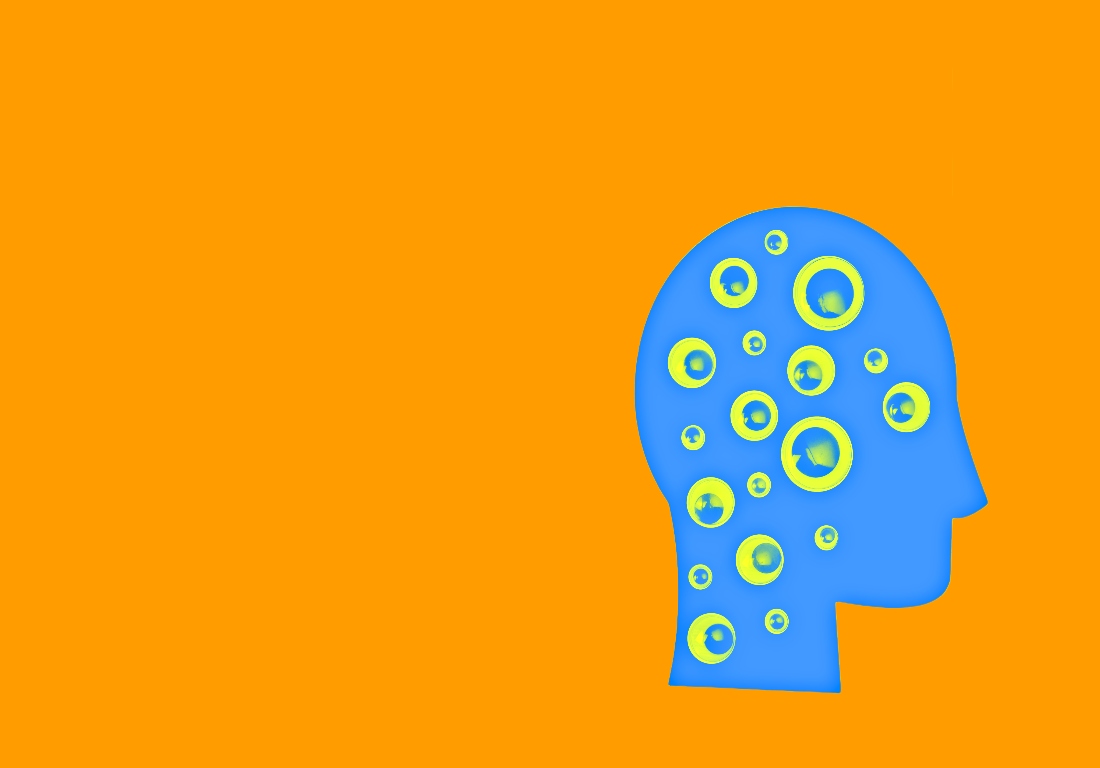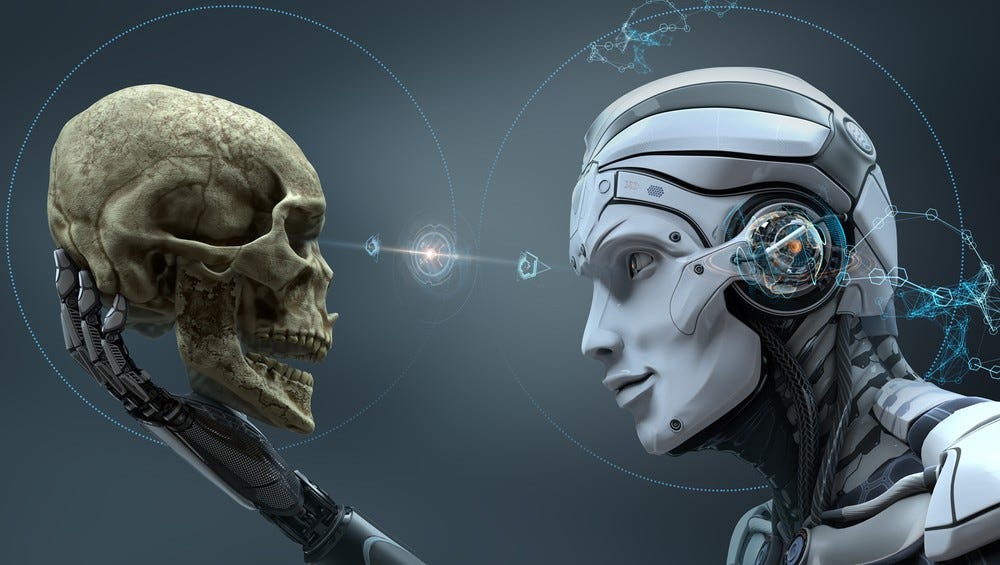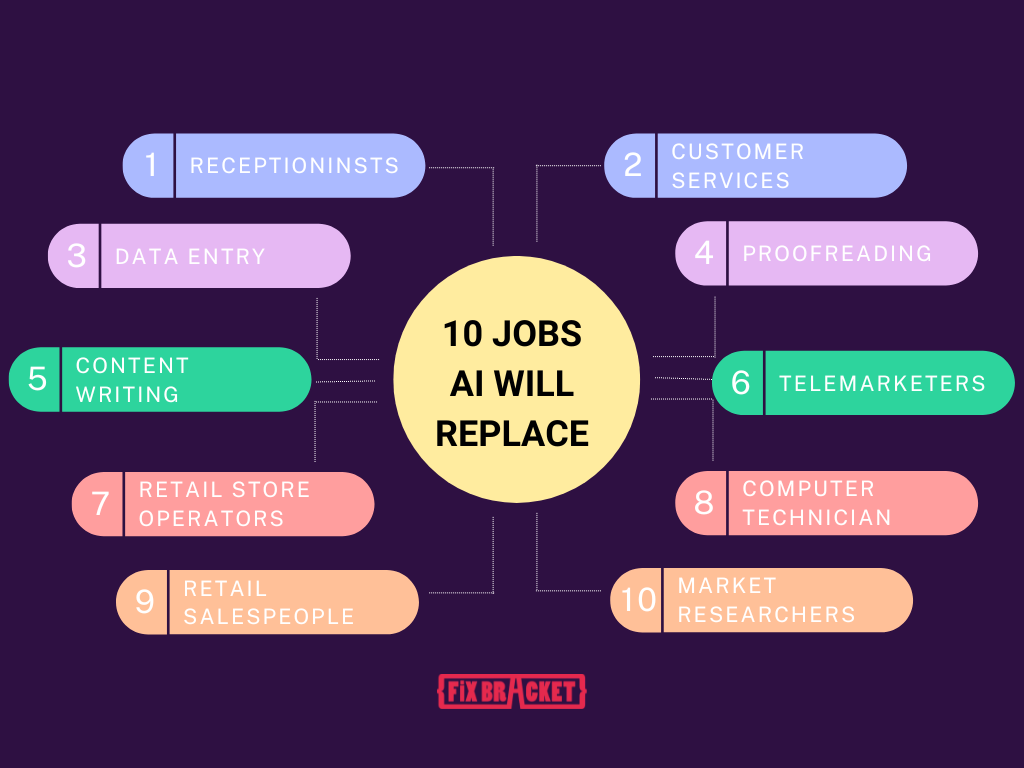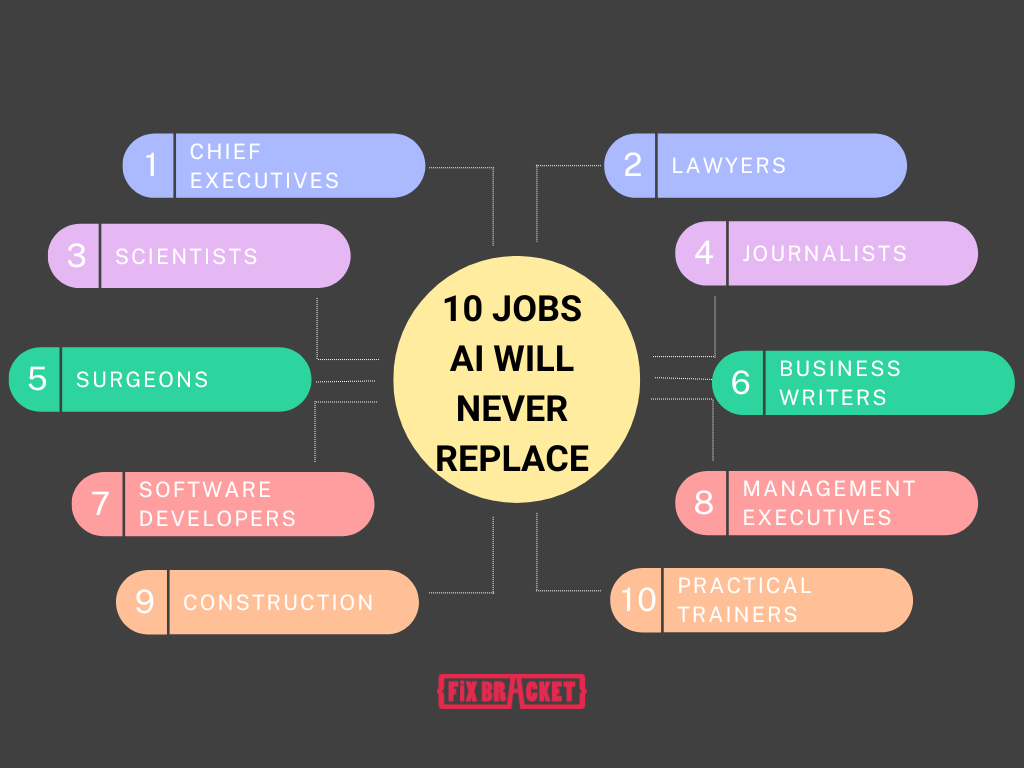
If you’re not aware of how AI (Artificial Intelligence) will impact jobs from 2023 to 2030, it’s like living under a rock! Right now, AI, especially cool stuff like ChatGPT, is grabbing all the attention. Soon a time may come when most business operations will be automated and there will be many jobs AI will replace under our noses.
Google just rolled out this new AI magic that can whip up presentations, crunch data, and even write content. There are many other AI tools like Gamma and Numerous AI-making waves too.
Here’s the deal: if you’re not riding the AI wave and still resisting, you might miss out on great job opportunities in the next seven years. AI is going to shake up some jobs, but guess what? It’s also bringing in new ones! So, buckle up and get ready for the AI ride!
In this article, we will see how AI can take over the jobs of working professionals and which jobs can be replaced by AI.
How Harmful Can Artificial Intelligence Be For The Future Of Jobs?

(source: Murat Durmus – Medium)
You know, when it comes to Artificial Intelligence, it’s a bit like any hot topic – you’ve got folks who are all for it and those who are totally against it. With new AI tools popping up and making headlines, it’s only making the gap between these two groups wider.
Some experts think AI can do wonders for society, boosting productivity, improving healthcare, and making education more accessible. But here’s the catch – we must get with the program now.
On the flip side, there are folks, especially those stuck in repetitive manual jobs, who think AI and robots are troublemakers. They’re worried that these tech advancements will snatch away jobs.
But here’s the deal – these robots and AI gadgets can open up a bunch of new job opportunities and help us tackle tricky problems, making our day-to-day lives smoother. The final verdict isn’t in yet, but the vibe is leaning toward AI being more of a good thing than a bad one.
How Will AI Automation Affect The Economy?
According to McKinsey’s Global Institute, AI could have a huge impact on the world economy, bringing in an extra $13 trillion in economic activity shortly, around 2030. That’s a significant 16% boost in the total GDP compared to today. This would mean an extra 1.2% growth in GDP each year.
The impact is expected to be on par with the transformative effects of other major technologies in history. The main sources of this economic boost will be the automation of jobs and a surge in innovation for new products and services.
The report also predicts that by 2030, about 70% of companies will have jumped on the AI bandwagon, adopting at least one type of AI technology. However, less than half of them are expected to fully embrace all categories of AI. Forbes chimed in, saying that AI has the potential to be one of the most disruptive technologies ever seen across the global economy.
10 Jobs AI Will Most Likely Replace
What we need to focus on is that AI works on a set of algorithms, which work automatically. Hence, AI tools are also sometimes called automation tools. The algorithms that work behind AI are set and there’s no space for creativity…absolutely zero!
Therefore, only those jobs that are repetitive and do not require critical thinking, are the jobs AI can replace in the future or the near future.
Here are 10 jobs AI is highly likely to replace fully or partially by 2030.

1. Receptionists
In the not-so-distant future, AI will likely take over repetitive jobs, like that of a receptionist. Think about it – routine tasks, answering calls, and scheduling appointments – are all perfect candidates for automation. AI systems are getting smarter by the day, learning to handle these tasks efficiently without fatigue or errors.
Plus, they’re available 24/7!
Companies are always on the lookout for cost-effective and efficient solutions, and AI fits the bill. While it might sound a bit futuristic, the signs are already there. Embracing this change could mean more time for humans to focus on complex, creative tasks that machines can’t replicate.
Due to all these reasons, we believe that receptionist is the most likely job AI will replace.
2. Customer Services
Customer service reps don’t need to be super socially or emotionally savvy these days. A bunch of companies use AI to handle common questions from customers. So, chatbots aren’t just for talking to customers – they also help out with stuff inside the company.
3. Bookkeeping (and Data Entry)
We are writing bookkeeping and data entry together as the work is the same. The only add-on with bookkeeping is multiple calculations. And today, when we have cloud accounting software, bookkeeping is a job AI has somewhat replaced already.
You might not be up-to-date on bookkeeping as a job these days. Instead of people doing all the data entry and bookkeeping stuff, bringing AI and Machine Learning into the mix makes sense.
The best part? No human calculation errors!
4. Proofreading & Content Editing
Editing is like the heavy-duty stuff, you know?
Dealing with tone, understanding the whole vibe, and all that jazz. On the flip side, proofreading is a piece of cake. Fixing grammar goofs, sorting out sentences – some apps can handle that with a snap. Take Grammarly, for instance. Pros swear by it for cleaning up their writing game.
5. Content Writing
We all know that the best content writer out there is ChatGPT. Almost all articles (including parts of this one) are assisted by ChatGPT and it’s an open secret.
Writing content is something that may be fully automated, including creative writing. Tools like ChatGPT are now able to write compelling stories, poems, and whatnot! The one skill related to content that is very important to the business world and cannot be replaced by AI is search engine optimization (SEO).
Writing blogs is one thing, and understanding human sentiment to make those blogs rank first on Google search results is completely different. However, content writing in itself has become somewhat obsolete.
6. Telemarketers
You know those annoying robocalls pitching stuff?
Well, turns out, the future for folks working in telemarketing doesn’t look too bright. The job market for telemarketing is predicted to shrink by 18.2% by 2031.
Why?
Well, these jobs involve a lot of repetitive and predictable tasks, which makes them perfect candidates for automation.
But here’s the catch: even though machines can take over the repetitive stuff, they can’t match the social skills and emotional smarts of a successful human telemarketer. So, while the robots might handle the routine, connecting with people on a personal level is still our turf.
7. Retail Store Operators
Since McDonalds popularised self-checkout kiosks, the concept has been normalized.
Do you know those self-checkout machines in stores? They’re like a prime example of automation in the shopping scene, especially in places like grocery stores and big retail spots.
So, when a company decides to have those self-checkout areas, it’s basically after doing some math on the costs and benefits. Sure, there might be a bit more shoplifting when customers scan their stuff, but overall, the company ends up saving more cash by needing fewer employees at the checkout counters.
8. Computer/Software Support Technician
By 2031, it’s expected that the field will grow by 6.2%. With tons of info online like guides and hacks, it’s no wonder companies will lean more on bots and automation to handle support questions from both employees and customers down the road.
It’s not very soon that AI will start writing its own code, but the repetitive job of a tech support guy is a job AI can replace easily. It’s not a very high-paying job anyway, and those are the types of jobs AI is most likely to replace.
9. Retail Salespeople
Businesses are making shopping easier for everyone with things like self-checkout. Nowadays, shoppers are pretty good with the internet, and they often look up stuff online before deciding what to buy.
But, when you’re talking with a retail salesperson one-on-one, it’s a different vibe. Their personal touch is not the same as a machine, and lots of people like having a real person help them out instead of dealing with automated and emotionless support.
However, as time progresses, people will more likely wanna get things done quicker, and machines can help there. Jobs AI can replace so far are not that many, or at least, these are jobs AI can partially replace. But retail sales aren’t a huge problem solver for retail stores, as people will buy things they need regardless of a salesperson being involved in the process.
10. Researchers (for business purposes)
We’re not talking about space research or stuff like that. There are vast portions of research that require highly skilled human effort. No AI can build physical machines to excavate the ground or fly a rocket into high-earth orbit.
We’re talking only about business researchers and analysts. They rely heavily on automation tools even today.
So, in the world of crunching numbers and digging into research, they’re already bringing in artificial intelligence to make things smoother. With today’s powerful computers, we can quickly organize, predict, and analyze data without much human help. As AI gets better, we might not even need humans to be hands-on in the whole data analysis and research gig.
10 Jobs AI Can NEVER Replace
Certain gigs are just too human for AI to swipe.
Jobs where empathy, understanding, and emotional connection are key, are tough for machines to replicate. Those are the jobs AI can never replace.
Think of roles requiring genuine creativity, the kind that stems from deep human experiences and emotions, not just algorithms crunching numbers. Anything involving complex problem-solving in unpredictable scenarios—AI struggles to match the unpredictability of human ingenuity. Then there’s the personal touch, jobs that require a unique human touch, you know, the kind that can’t be programmed.
So, jobs where the human touch is irreplaceable, where intuition and a dash of soul make all the difference, those are the keepers.
Here are the ten jobs AI will never be able to replace (most of them are decision-maker roles):

1. Chief Executives
AI can’t step into the CEO’s shoes. Leading a company is more than data crunching; it’s about vision, strategy, and navigating the human side. CEOs make tough calls, understand emotions, and bring that unique blend of leadership only humans can muster.
2. Lawyers
Lawyers bring more than just legal knowledge; it’s about understanding human nuances, and context, and navigating ethical intricacies. AI lacks the empathy, moral reasoning, and contextual grasp needed for the dynamic nature of legal practice, making lawyers indispensable in interpreting and applying the law effectively.
3. Scientists
Scientists can’t be swapped out for AI because they bring more than data-crunching skills. It’s the spark of curiosity, creativity, and the ability to ask new questions that make scientists irreplaceable – AI can’t match the human touch of discovery and innovation.
4. Journalists
Journalists bring a unique human touch to storytelling, combining empathy and context. AI struggles with nuanced understanding, emotional depth, and adapting to rapidly evolving situations. But most importantly, if AI starts handling journalism and news writing, people will lose complete trust in the media (not that haven’t already).
5. Surgeons
Surgeons are irreplaceable because their craft involves nuanced tactile skills, adapting to unforeseen complexities mid-operation, and relying on instinctive judgment. While AI can aid in diagnostics, the intricate blend of technical prowess and human intuition in surgery remains beyond its reach.
6. Business/Marketing Writers
Those writers whose work affects business revenue directly or indirectly are called strategic writers or business writers. Several niches within writing will soon be completely taken over by AI, and many will never.
For instance, AI is getting good at taking over some writing jobs, like News Writers who deal with facts. It’s handy for Content Writers covering basic topics, and making straightforward content using data. Product Description Writers can use AI to create detailed descriptions by looking at product features. Also, AI helps Technical Writers with simple manuals. These jobs involve organizing information and following rules, which AI is good at doing efficiently.
On the other hand, AI is unlikely to replace certain writers, such as novelists who weave intricate emotions into narratives. In-depth industry analysts, mastering business complexities, and strategic marketing content developers, blending creativity with strategy, remain beyond AI’s reach. For political or high-stakes speeches and PR, the nuanced understanding of human dynamics, emotional resonance, and strategic communication needed is currently a distinctly human skill. AI’s strengths lie in data-driven and rule-based content, while the subtleties of creative expression and strategic insight continue to make certain writing domains uniquely human.
7. Software Developers
The big gap in scores probably comes from these new behind-the-scenes tools that make life easier for web developers. These tools do cool things like writing fresh code, filling in missing parts, and fixing errors.
Now, why can’t machines take over?
Well, making software is no walk in the park for us humans. It’s a tricky job, and getting the hang of it takes time and skills. Creating apps, software, and websites is no joke, especially because developers need to nail it to make awesome stuff for users. The field is expected to boom by 30.3% by 2024, so if you’re a software whiz, you’re in a sweet spot for now.
8. Management Executives
AI might be impressive, but when it comes to running the show, management executives have the upper hand. Steering the ship of a company requires more than algorithms and data crunching. Decision-making, leadership, and understanding the human side of business are what make execs invaluable. A stat worth noting: despite the tech surge, a whopping 94% of CEOs believe soft skills like communication and problem-solving are crucial. AI might handle tasks, but the intricate dance of managing people, strategy, and unforeseen challenges? That’s where humans shine, proving that in the executive realm, AI can’t replace the finesse of skilled human leadership.
9. Construction, Extraction & Mining
No robot’s taking over the hard hats and steel-toed boots anytime soon! Construction, Extraction, and Mining jobs are safe from AI invasion. Why? Because these roles demand hands-on skills, adaptability to unpredictable environments, and a human touch that technology can’t replicate. The U.S. Bureau of Labor Statistics says these jobs are projected to grow by 4% from 2020 to 2030, proving that even in our tech-savvy world, real people on the ground are irreplaceable. No algorithm can replace the expertise of those who build and extract the foundations of our physical world.
10. Practical Educationalists & Trainers
Teaching is more than just transferring information, and that’s where AI falls short. Practical educationalists, with their real-world experience, adaptability, and empathy, bring a unique touch to learning. AI lacks the personal connection and understanding crucial for nurturing students. According to a recent study, more than 90% of students believe that a human touch in education is irreplaceable. Practical educators guide students through challenges, fostering critical thinking and problem-solving skills—elements that go beyond AI’s capabilities. In a world increasingly embracing technology, the irreplaceable value of practical educationalists lies in molding well-rounded, adaptable individuals, a feat AI struggles to achieve.
Wrap-Up: How To Future-Proof Your Jobs AI Might Steal From You?
Between January and May 2023, 417,500 jobs bit the dust, and surprisingly, only 3.9k of them, less than 1%, were AI-related. But hey, the uncertainty might have you thinking about your career’s future. The secret weapon? Re-skilling.
Re-skilling isn’t just for doomsday prep. Most jobs expect some professional development, so this might be an old hat for you.
Consider diving into different AI tools, figuring out how they can jazz up your daily grind, or maybe snag a course to learn a fresh skill. As mentioned earlier, AI’s big play might just be making us superheroes in our careers. But, if your gig takes a hit, being a re-skilling pro leaves you ready for the next big thing, where you can flaunt your skills as a versatile candidate.
And of course, leadership positions are always safe from AI. So, re-skilling yourself to be a leader might be the strongest start!




